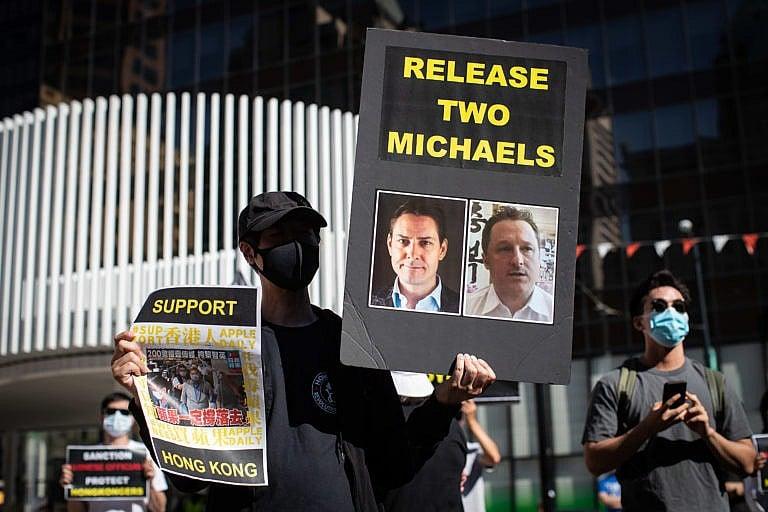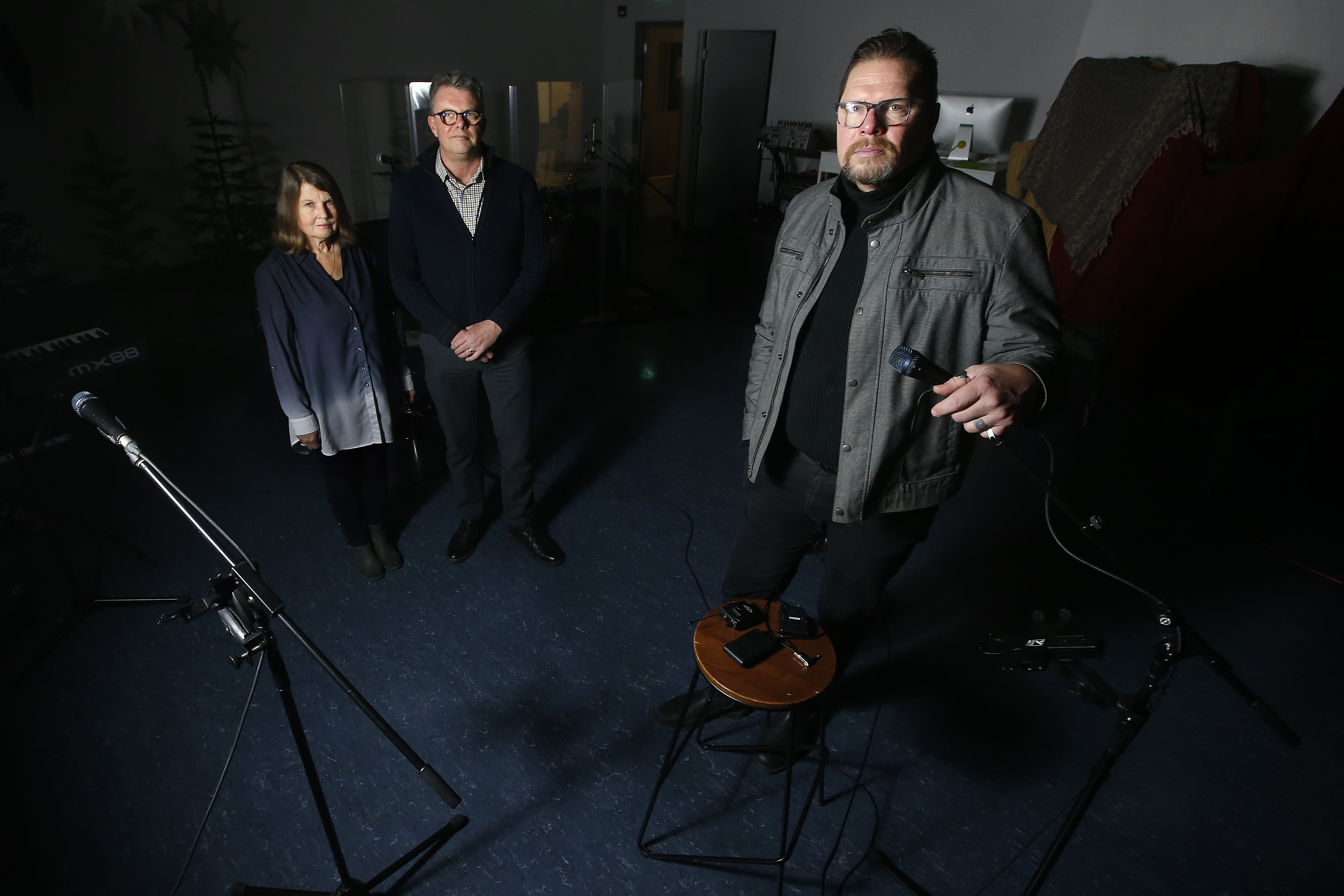What it’s like to be on trial in China
Kevin Garratt, a Canadian wrongfully convicted of espionage by a Chinese court, knows what Michael Spavor and Michael Kovrig are about to go through

(Darryl Dyck/CP)
Share
Kevin Garratt and his wife, Julia, spent about 30 years living, teaching and doing Christian aid work in China before—to their utter shock—they were arrested in 2014 on accusations of espionage.
Charges against Julia were dropped after she’d been in detention for six months. But Kevin spent 14 months in a crammed jail with 13 other cellmates and went to trial in April 2016. After another five months in detention, he was convicted on the trumped up charges, and handed an eight-year prison term.
Then, two days after his sentencing, Garratt was abruptly deported back to Canada.
The entire proceeding appears to have been retaliation for Canada’s decision to arrest a Chinese businessman, Su Bin, and extradite him to the U.S., where he eventually pled guilty to hacking into the computer systems of U.S. defence contractors.
The parallels between the Garratts’ story and that of Michael Spavor and Michael Kovrig are undeniable. Unfortunately for the two Michaels, they appear to be the tit-for-tat retribution for the arrest of Meng Wanzhou, the chief financial officer of Huawei and a far more high-profile Chinese citizen than Su Bin was. She is far less likely to plead guilty.
The Garratts now live in B.C.’s Lower Mainland, and Kevin has written a book about his ordeal. He spoke to Maclean’s writer Michael Fraiman on the eve of the trial of Michael Spavor, which takes place on Friday morning, local time, in Dandong, China. Kovrig’s trial is set for Monday.
Just before we started recording, you were saying Michael Spavor will be in the same courtroom that you were.
Yeah, he was in the same prison I was in, just down the hall from where I was. I understand he was in cell 315—I was in 318. There’s only one court building in town, so that would be where he goes.
What do you think is going through the Michaels’ minds right now, on the eve of this trial?
Probably a couple of things. One would be hope that the trial will solve things. But the problem in China is, with trials, you’re presumed guilty—you’re not presumed innocent—there’s a 99.9 per cent chance of conviction. So, basically, they’ll be convicted.
So what is the point of having a trial?
To say they follow the law, their own law. And to say, “Yes, they were guilty. Yes, they did this, according to our law.”
Could you describe the trial experience a little bit?
The trial was set for, I believe, around 9 o’clock in the morning on April 20. They took me there, probably around eight, took me in handcuffs and leg irons, and put me in a van with two officers. And then I’m taken into the court building area, we go up in an elevator to a kind of a waiting area just for prisoners. You’re put in a little, tiny room, like a little closet that’s padded and has a bar door on it. And you wait there until it’s time to take you to the courtroom.
Then I was taken to an older looking courtroom. They brought a camera and the guy was setting up when we got there. I was set aside in the middle of the courtroom, basically by myself on a chair. In front of me were three judges—a main judge and two junior judges, I guess. To my left were two prosecutors, also very young-looking, and an interpreter. To my right was my lawyer—who, actually, I couldn’t talk to during the trial. It was very confusing, what I could and couldn’t do. Mostly I couldn’t do anything.
The trial went on all day. There was a lunch break, and I was put back into the padded room for about an hour and a half or so, then back to the court. Then, the same kind of thing. I didn’t understand everything that was going on, like the technical language, which I couldn’t pick up on. At the end of the day, I have to go over the transcripts and approve them. You know: “Is this what was said?” And I said, “Well, yeah, it could be, I don’t know.”
Then I was put back into the van and went back to the prison, probably around 5:30 or 6 o’clock in the evening. And that was the the whole day. When you realize that the outcome was already decided, it’s kind of like, “So why are we here?” But you still have that hope, right? You still have hope something will happen.
What kind of defence does your lawyer make?
Because it’s what they call a “national security” case, the lawyers can’t do much. They can say, “Oh, he really didn’t mean to do anything.” Or, “You know, maybe some pictures he took were sensitive, but he had no idea.” You know, “He’s he’s very repentant,” or something like that. He can’t do a whole lot, but he can try.
How long was your trial in total?
Nine to five, basically. But I saw 80 or 90 people pass through my cell in those 19 months I was there. There’s 14 people [at a time] in the cell. I saw people leave at 8 o’clock in the morning and be back by 10. Guilty. They’ll be shipped off to the big prison. There’s a formality.
The charge of espionage—it’s the same for them as it was for you—does this change the nature of the trial system, as far as you know?
I just know they have the choice to make it a public trial or a closed trial. A closed trial is good, because that means they want it to kind of just go away—they will make their decision, and it sort of goes away. (Editor’s note: Michael Spavor will have a closed trial, as did Garratt.) If it’s an open trial, then they’re making a statement. There’ll be witnesses and the government will want to make it very, very public. And when the defendants will be found guilty, it’ll be on national TV, things like that.
I also want to say that with the trial, I was really very nervous and quite afraid, because I didn’t know what to expect. I’ve seen trials on TV, but they’re not the same at all, especially when you have three judges staring down at you from a platform and you don’t understand the proceedings. You don’t really get a chance to talk, you can’t talk to your lawyer. It’s very upsetting, that way. Very disconcerting.

I imagine that’s intentional.
Of course, it is intentional.
What does that 99.9 per cent conviction rate say to you about the nature of the justice system in China?
It basically says the system is always right and you’re wrong. That was very evident in the prison, itself. Every once in a while, the warden would come on the loudspeaker, they would give a little talk. And basically, they would say, “Suck it up, you’re here for a reason, take your punishment.” Meaning, you’re guilty, so why are you crying? Why are you upset? Why are you complaining? Just deal with it.
Let’s talk a little bit about what happens next. The Michaels will be convicted, almost certainly. What is the process for what takes place after that?
You can appeal, and I’d seen a few people in my prison appeal. I was advised not to , because that would mean many, many more months in prison waiting for the next court appearance. That’s the advice I took—which is not admitting guilt. It’s just saying, “I just want to get out of here.” I didn’t know I would be deported, that was almost five months later.
Does the appeal process change the outcome very often?
Sometimes, a little bit. I saw sentences go down from 10 years to five years. In my case, since it was an international case and more public, it wouldn’t change anything. Or it might be worse.
What do you think will happen next? Do you think they will get deported? Could this be a longer-term prison sentence until the Meng Wanzhou situation is figured out?
I think until Meng Wanzhou is figured out, it’ll probably keep going. My actual verdict hearing didn’t come until almost five months after the trial. My lawyer had said, “I expect something in two to three weeks.” Knowing China, I thought, oh, maybe four to six weeks. And then it was five months. They can delay and delay and delay as much as they want. I met one guy in prison who had been there probably six years, still waiting to go through his appeal.
So in that light, knowing that it could even be many more months until a verdict is reached, or they’re deported, this trial means even less.
The government has the freedom to do what they want, when they want to do it. They don’t have to wait. They can deport them. They could put them in prison—an actual prison, since what they’re in now is basically a detention centre, which is almost the same as prison. But once you get to a local prison, then you’re actually working.
So even weeks after this trial, it may still be status quo for them.
My guess is it will be, until something positive happens with Meng Wanzhou. If she gets extradited to the U.S., I don’t know how well it will go for the Michaels. I just can’t guess that. I don’t know what [the Chinese authorities] are thinking.